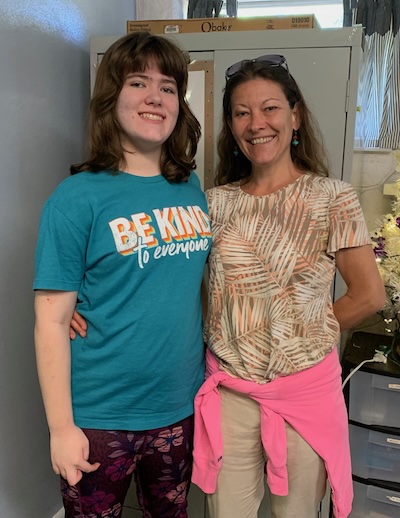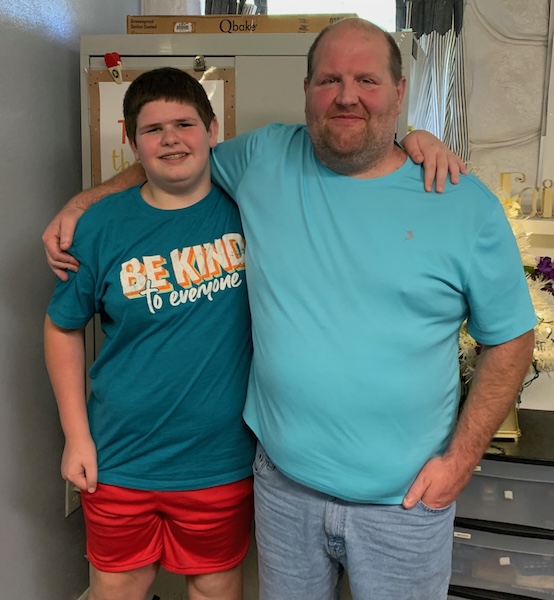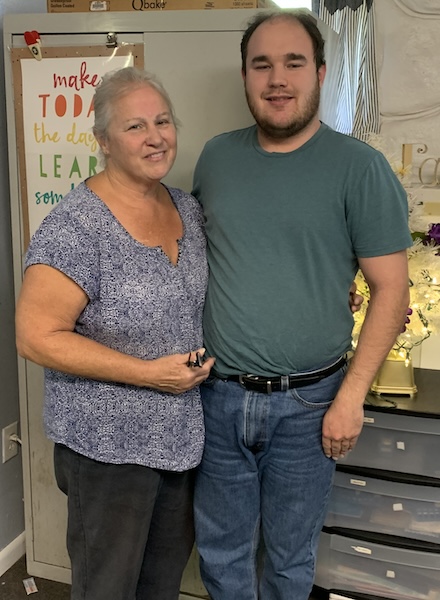Imagine the Possibilities: School for Exceptional Children in Ocala Develops Opportunities
Imagine the lights in the grocery store are so bright they hurt your eyes, making it hard to see the food on the shelves. Imagine the disorder of items left on the half-empty shelves sends you into a panic that renders you motionless. Imagine the sounds in the store distract your attention so intensely that you cannot hear what the cashier is saying, and the people in line behind you become irate.
Children growing up with autism don’t have to imagine. In many cases these are the type of realities they face. They can’t do what the other kids are doing, and they can’t explain why. In some ways, they live in their own world, but everyone expects them to participate in society.
Parenting is certainly not an easy job, but raising a child with autism has unique challenges.
Imagine your child is old enough to start school, but she isn’t talking yet. The teacher doesn’t understand the picture sign language you use at home, and the school will only continue her speech therapy one day a week.
Imagine your child hid under his desk at school because it was the only place he could find where he felt safe from all the noise and commotion of the other children. When he refused the teacher’s continued commands to come out, the resource officer dragged him out and arrested him under the Baker Act, claiming he was displaying a mental illness that made him a threat to himself and others.
Raising a child with autism can be exactly like this.
Autism: The Basics
Autism Spectrum Disorder is defined on the CDC website as “a developmental disability caused by differences in the brain.” The term autism encompasses a group of conditions that often manifest in delayed development of language, movement or cognitive skills; unusual emotional reactions; obsessive-compulsive behaviors and extreme aversion to socialization.
An average of one out of every 36 children in the U.S. is diagnosed with some form of autism around the age of five, although some go much longer before their condition is recognized. Children living with autism become adults living with autism, although in many cases as adults they learn to adapt and can live productive, independent lives.

Getting the Right Education
“The public schools are just not equipped to handle children with special needs,” laments Sarah Reed. Sarah’s daughter Amaya started out in public schools. “Not having transparency, clarity or a whole lot of say was frustrating.”
Amaya is a quiet 14-year-old who looks at the floor when meeting someone new. Her initial conversation consists of repeating what is said to her. “It’s hard to draw her out and get her to engage,” Sarah admits. “She requires a lot of repetition and scripting.”
Amaya is now a student at New Horizon Academy for Exceptional Students in Ocala where she excels at math and enjoys learning in the comfortable, small class setting. “Amaya enjoys numbers and dates,” says Charity Guimaraes, principal at New Horizon. “You only have to tell her a birthdate one time and she remembers it.”
The program at New Horizon incorporates academics with socialization and daily living skills. Just like in public schools, each student here has an individualized education plan (IEP). The plan is written by the teachers with input from parents and details the special education instructions, supports and services the student needs.
Those services often include speech therapy and occupational therapy. Therapy sessions help children overcome issues with sound or texture or certain types of food that keep them from interacting with the world around them. Getting past those issues helps draw the children out and allows them to live healthier, more connected lives using their powers of language, for example, to communicate.
“We keep our student-to-teacher ratio small, so each student can get the attention he or she needs to succeed,” Charity offers. There are currently seven students attending New Horizon. Charity suggests they would probably cap attendance at 12, explaining that parents like the opportunity for their kids to get more one-on-one attention from the teachers.
The New Horizon Difference
“Here there is transparency,” says Gary Frost, father of a New Horizons student. “If there is a problem, it is handled together with the parents.”
Gary’s son Braden left the public elementary school he was attending several times without being noticed. It’s not unusual for kids with autism to wander off when they feel anxious or overwhelmed. “The public schools are not fenced, and they can’t keep the kids safe,” Gary exclaims.

“Braden hid under his desk when he first came here,” Charity says, pointing out that Braden has his own peculiar behaviors, means of protecting himself against the world he sometimes finds scary. Today, Braden seems equally comfortable working independently or talking about his favorite school activities.
Parents of autistic children understand they each have their own ways of dealing with circumstances that overwhelm them. “Sean got kicked out of pre-school when he was three and a half,” Brenda Simpson says about her son. “His speech was delayed. He would stand and stomp his feet because he couldn’t tell you what he needed.”

When Sean came to New Horizon as a child, he was climbing on everything. His mother describes him as so agile he could walk on a fence like a cat. Today, as a graduate of New Horizon, he sits quietly (in a chair) at the computer.
“Kids come out of their shells when they come here,” Charity says. “We treat them like our own children.” It’s hard to know if that fact is more comforting for the children or the parents.
Learning Much More than Academics
There is a socialization aspect built into the curriculum at New Horizon that emphasizes skills of daily living. The chore chart on the refrigerator door, just like in many households, is a small part of that. Students bring lunch to school, prepare it themselves and clean up every day.
Fieldtrips are also part of the plan. “We try to get out once a week, usually on Fridays,” Charity explains. Fieldtrips to Publix or Walmart familiarize students with the public spaces in their community and desensitize them to the sights and sounds that might otherwise make them anxious.
Preparation is key to these trips out into the community. Students work on everything from parking lot safety to self-awareness when walking down the aisles in a store. “We help students anticipate the sights and sounds they will encounter that might be challenging for them and rehearse strategies for dealing with them,” Charity explains.
Of course, no trip to a store is complete without a math lesson. Students plan their purchases and count and organize their money before they go. The lesson includes looking at the cashier, paying with the correct amount of money, counting their change and taking the receipt.
Over the Horizon: Graduation
Graduation indicates something different for each student. Students can attend New Horizon, working toward their academic and social goals, until they are 22. After that, they might transition to an adult program, go on to vocational training, get a job…the possibilities are numerous.
“We try not to set goals for Braden based on autism,” Gary explains. “He’s already got money saved in the bank for his first car. He’s setting his own goals.” Braden has an intense interest in science and can already quote obscure animal facts he’s only read about. He also enjoys writing stories.
Sean’s future may not include a car or a driver’s license, but his unique talents as a horseback rider have opened doors for him. Sean’s amazing sense of balance served him well when he first soloed on horseback at the age of 11. Today, he is already an accomplished equestrian, competing in Special Olympics. “He did well at regionals four times,” Brenda beams with pride. “There will definitely be horses in Sean’s future.”
The future for Amaya will likely involve her fantastic memory and organizational skills. “Amaya loves to come to work with me,” Sarah says. “She organizes all of my orders and can remember when a client ordered the same thing last month or last year.”
New Horizon is the common factor for these three children, and several others, that allows them to learn and grow into the adults they are capable of being. The not-for-profit private school has been serving students with varying degrees of specific learning and behavioral needs since 2002. New Horizon provides a positive learning environment, extremely small classes and daily communication with parents to guide students to their ultimate development.
To learn more, contact Charity Guimaraes at NHAexceptionalstudents@gmail.com.

